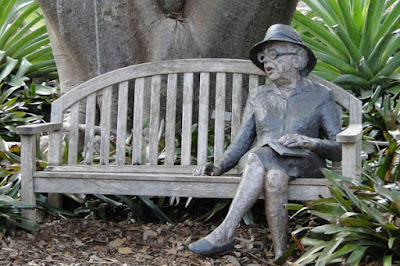 |
| Photo Credit: UC Berkeley, Bancroft Library |
In my life life, there is one person that had always been there for me, that was my mother.
I have two sibling that could never be trusted and would never be there for me like my mom. My mom had always had my back when my siblings let me down.
There was something about my mom that made it difficult for others to understand. Some perceived her as a sweet old lady. But others perceived her much differently. When a server would ask her how the food was, she would often reply: "Do you want me to be perfectly honest?" And then, as a former county fair judge would tell them how she really felt. It's didn't matter if it was the local diner or a five star restaurant. Her critique didn't stop there. If I ever cooked something, she would always tell me the one or two things that was wrong with it. I still have some minor PTSD from a batch of undercooked rolls.
My mother also took a very long time making decisions. My father was a very patient man, but one of the reasons he probably didn't like shopping was that it almost always took hours for her to make a purchase. It didn't matter if was some artwork from a shop in a foreign country or some fruit at the local market -- she took the longest time of anyone I have ever known. When my father wanted to plan a trip in the distant future, she would rarely commit until hours or seconds before it was time to leave. There were times that she simply decided at the last minute not to go.
There was also the hoarding. My mother rarely threw anything away, especially magazines, rubber bands and toys from our childhood. When my aunt was visiting, it was the first time I felt that there might be some type of hoarding gene in her DNA. When I started to throw out some ripe bananas, my aunt or her sister scolded me as she saved those blackish bananas from the garbage. The bananas later surfaced in a loaf of banana bread. My mother struggled with even throwing out the newspaper flyers that were left in her mailbox.
I am certain my mother loved me. Although she never really said it and showed it with a hug. In my younger days, she was always there for me. She came through in moments of adolescent distress. When I needed shoes she always made sure I had exactly what I wanted. That wasn't always easy as every family has a sibling that is a score keeper. We also shared some interests and on a Family Weekends I would like to take her to the Casino. But then there was always that sibling that never wanted the Family to do what my mom and I wanted to do. When it was time to support my marriage, my mother was there for me. That was not something she did for my siblings -- a part of her that was misunderstood. That was unfortunate for them. When there was divorce, my mother was there for me. When I needed chid care, she was there for me. As they say "Actions Speak Louder Than Words" that was my mom.
Then one day my relationship with my mother changed. I no longer lived close to my mother and now found myself thousands of miles away. During those years as she aged, I would fly in to see how she was doing. As years progressed it became more difficult for her to collect her records to send to the accountant. I also noticed in her confused state that one of the siblings was stealing money from her. She spent less time cleaning her house. Before boarding a plane back to the East Coast, I would find spending hours organizing her records for the entire year and then vacuuming her house before I rushed to airport.
The day finally came that someone needed to take her into their home. Her doctor called me not her siblings and said that she should no longer Live alone. Among my two siblings, there were no volunteers.
The next thing I knew she was living with me thousands of miles from her home. It was not easy at first, she was disoriented. Some of her medical conditions went unnoticed under the neglected watch of my myopic siblings. And that was around the time that Dementia set in. Her small town doctor said there was nothing that could be done.
I live in a retirement community state and the doctors here had a larger recommendation of treatments and medications that the small town doctor didn't. Perhaps it's because of the larger population of aging patients. Between that and the arthritis in her swelling finger joints that the specialist said was simply "unacceptable" it was the first time she let me become the caregiver. She would always thank me for all that I did for her.
I was focusing on the caregiving and should have known that my untrustworthy siblings were plotting. I should have known when one of them claimed my mother wanted to give one of the siblings a huge sum of money or manipulate a loan from her. Was she being kidnapped or coerced? Was this financial manipulation? That day they would become her new caregivers. That's when they became very secretive about her finances. I was now isolated from my aging mother. From that day, I would never hear another word about my mother's health or finances again from those spiteful siblings. Perhaps one was married to a doctor and thought she was a doctor. I think the other one just wanted money for her newly built home.
When it comes to Dementia, there are some critics that say those drugs don't work. During the time the geriatric psychiatrist told me she should be sharper than she was, I was convinced and observed that they did. When she finally was moved or in other words held hostage in her new Assisted Living Facility, that same small town doctor told me she walked to his office from her home. I always thought that he was pressured into saying that but maybe not if those drugs Dementia drugs worked. Today, I see some of those drugs advertised on TV.
An email arrived almost five years later from my sibling informing me that my mom had suffered a stroke. My mom always told me on the telephone that she would fix things. She said she wanted to get on track again. That would never happen. It sounded like my mom would never speak to me again.
I went right to the airport and boarded a plane. After the long flight from the East Coast I went to visit her today. As one would expect, these sibling would insist on being present when I was with my aging mother. As she lay there in the final moments of her life, she opened her eyes as wide as they could and tried to speak but the words just never came out. I would imagine her only words to me would have been: "My number one son, my only son. I can still fix things, it's not too late".
One thing was certain -- she will never be there for me again.






